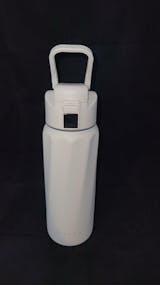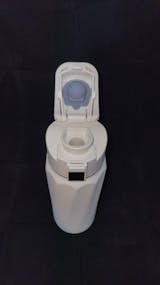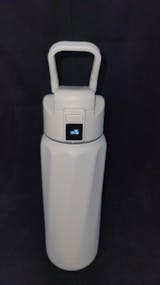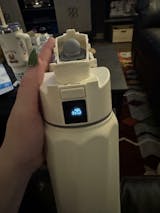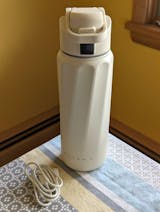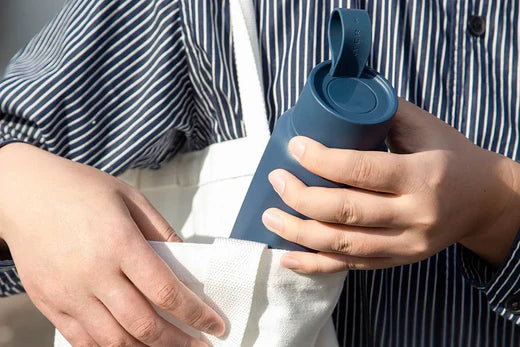
How to Stay Hydrated While Traveling: Essential Tips and Tools
Staying hydrated can often slip to the back of your mind when you're on the go. Whether flying across the country, embarking on a road trip, or exploring a new destination, maintaining proper hydration is essential for your health, energy, and well-being. Dehydration can lead to fatigue, headaches, poor concentration, and even more severe health issues. This post will share essential hydration tips and the tools to stay refreshed and energized throughout your travels.
Why staying hydrated is crucial while traveling?

Hydration isn't just about quenching thirst. When traveling, staying hydrated is essential for several reasons:
- Body and skin health: Dehydration, with dry skin and lips, can leave you feeling tired. Air travel, especially, can be very dehydrating due to the low humidity in airplane cabins.
- Mental clarity and mood: Hydration affects your mood and mental clarity. Dehydration can lead to irritability, sluggishness, and difficulty concentrating, which is especially challenging when navigating unfamiliar places.
- Energy levels: Keeping hydrated helps prevent fatigue, jet lag, and other travel-related exhaustion. When your body is well-hydrated, it functions better, giving you more energy to enjoy your trip.
- Immune support: Traveling exposes you to new environments, climates, and people. Staying hydrated supports your immune system, helping you avoid getting sick while on the road.
How to maintain hydration while traveling?
To avoid dehydration during travel, you need a game plan before, during, and after your trip.
Before you travel
- Hydrate in advance: Start your trip well-hydrated by drinking plenty of water the day before departure. Being slightly dehydrated before your trip can make rehydrating harder once you’re on the road.
- Limit dehydrating drinks: While caffeine and alcohol may seem tempting, they act as diuretics and can contribute to dehydration. Try to avoid them in the 24 hours before your trip.
During your journey
- Sip throughout the day: Drink water regularly, even if you don’t feel thirsty. Keep a refillable water bottle on hand and take small sips every 20-30 minutes.
- Choose water over sugary drinks: While sodas and juices may seem refreshing, they often contain sugar or caffeine, which can dehydrate you further. Stick to water as your primary hydration source.
- Set reminders: If you have trouble remembering to drink, set an alarm on your phone or use a hydration app to remind you to take a sip.
After arriving
- Rehydrate with electrolytes: When you arrive at your destination, drink water or an electrolyte-rich beverage like coconut water to replenish lost minerals, especially after a long flight or road trip.
- Adjust based on climate and activity: Your hydration needs will increase if you’re traveling to a hot or high-altitude destination. Be aware of how much water you’re consuming and adjust accordingly.
Hydration challenges while traveling

Several factors can make staying hydrated more difficult during travel. Here’s how to deal with common challenges:
Flying
Airplane cabins have low humidity, which can cause dehydration. To combat this:
- Bring a refillable water bottle: Most airlines will allow you to bring an empty water bottle through security, which you can refill once you pass the checkpoint.
- Drink water regularly: Ask the flight attendants for water throughout the flight. Avoid waiting until you're parched—dehydration sets in long before you feel thirsty.
- Avoid alcohol and excessive coffee: While tempting, both alcohol and coffee can dehydrate you, especially at high altitudes. If you do indulge, make sure to drink extra water to balance out the effects.
Long road trips
Dehydration can be easy to overlook during long drives, especially if you're caught up in conversations or distracted by scenic views.
- Pack plenty of water: Stock up on bottled water or use a large refillable water bottle to avoid running out. Consider bringing a cooler with electrolyte drinks to keep your hydration balanced.
- Plan regular stops: Stop every few hours to refill your water bottle and stretch your legs. This will help with both hydration and circulation.
Hot or cold climates
Both hot and cold environments require special attention to hydration.
- In hot weather: Sweating increases your need for water, so drink extra fluids in a hot climate. If you're doing physical activities like hiking, consider adding electrolytes to your water to replace lost minerals.
- In cold weather: Dehydration can occur even in cold weather since you may not feel thirsty. Keep drinking water and consider warm drinks like herbal tea to stay hydrated.
Tools and products to help you stay hydrated
Several tools and products can help you monitor your water intake while traveling to make hydration easier.
Smart water bottles
- Hydration-tracking bottles: Smart water bottles like the WaterH help track water intake. These bottles sync with an app on your phone, reminding you when to drink and helping you stay on target.
- Why it’s ideal for travelers: If you're constantly moving, these bottles ensure you don’t forget to drink water, even when you're busy sightseeing or meetings.
Portable water filters
- Safe drinking water anywhere: Portable water filters are perfect for international travelers who may encounter unreliable water sources. These filters remove bacteria and viruses, allowing you to safely drink from rivers, lakes, or questionable tap water.
Collapsible water bottles
- Space-saving hydration: Collapsible water bottles are perfect for travelers with limited packing space. They’re lightweight, flexible, and easy to store when you’re not using them.
Hydration tablets and electrolyte powders
- Electrolyte boosts: Brands like Nuun, Liquid I.V., and Ultima Replenisher offer hydration tablets or powders that dissolve in water, quickly replenishing lost electrolytes during long flights, intense activities, or hot climates.
Tips for Staying Hydrated During Different Types of Travel
Each type of travel comes with its hydration challenges. Here’s how to stay hydrated no matter your travel style:
- Adventure travel: For outdoor trips like hiking or camping, bring a water bladder or hydration pack that can carry more water, and always have a backup method for purifying water (like a filter or purification tablets).
- Business travel: It’s easy to forget to hydrate in busy business schedules. Keep a water bottle with you during meetings and work sessions, and use hydration apps like drink bottle reminder to remind you to drink between tasks.
- Road trips: If you're on the road for hours, ensure you have a ready supply of water and healthy snacks to stay hydrated and avoid energy crashes.
- Cruises or hotel stays: Many hotels and cruise ships offer water refill stations, so take advantage of them. In your room, keep a bottle of water on hand to drink throughout the night.
Conclusion
Staying hydrated while traveling is crucial for maintaining your health, energy, and overall well-being. By following these tips and using the right tools—such as smart water bottles, portable filters, and hydration supplements—you can ensure hydration is one less thing to worry about. So next time you head out, make water your travel companion, and enjoy your journey to the fullest! Following WaterH to find more tips for stay well hydrated.













